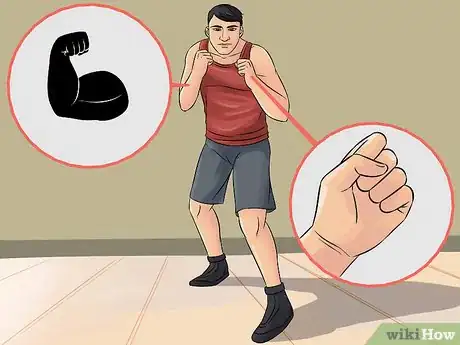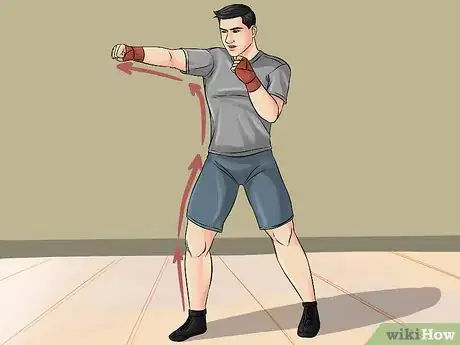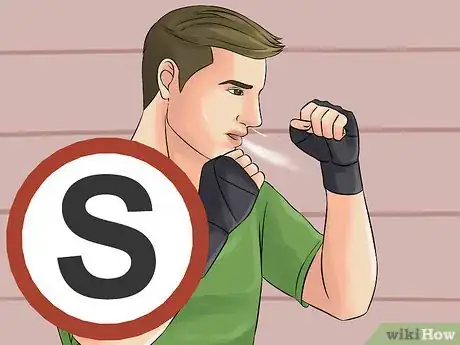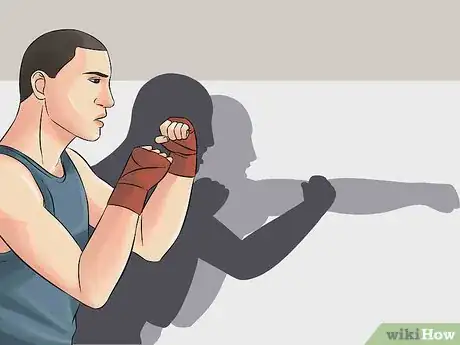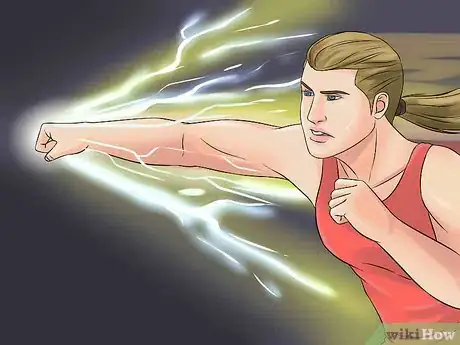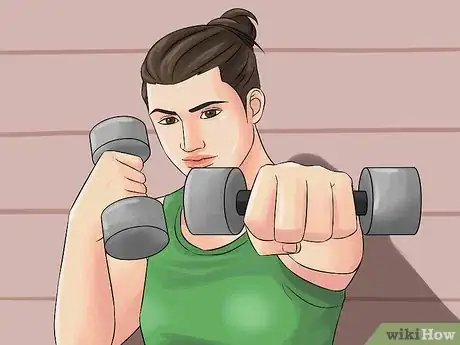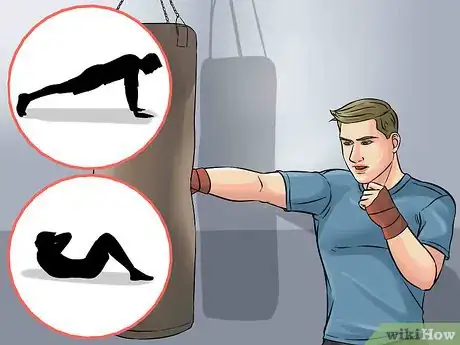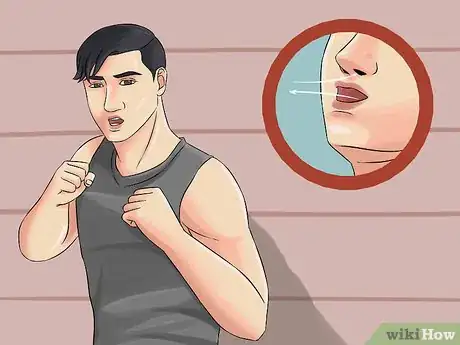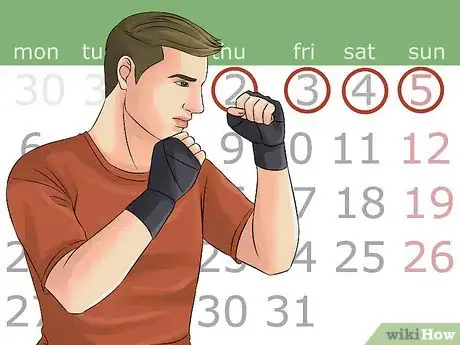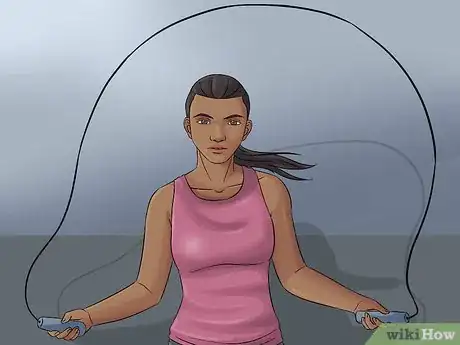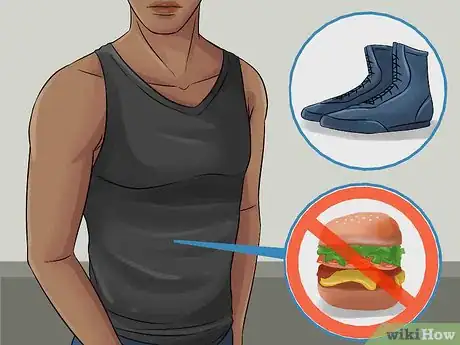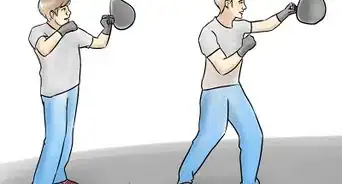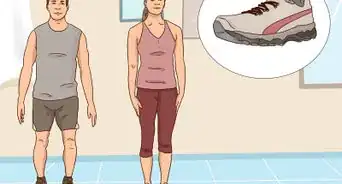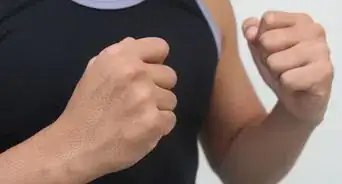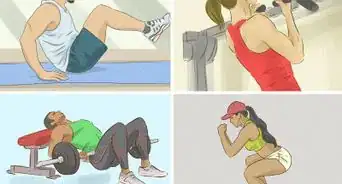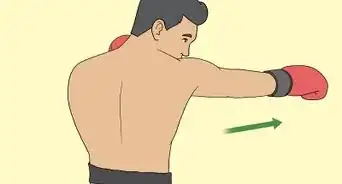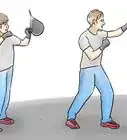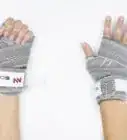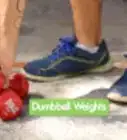This article was co-authored by Asher Smiley. Asher Smiley is the Owner and Lead Instructor at Krav Maga Revolution in Petaluma, California. Asher has earned a Tier 1 Instructor Certification in the American Krav Maga system. In 2017, he trained with the International Kapap Federation Combat Krav Maga International, completing their 7 day tactical seminar and the 8 day CKMI instructor course.
There are 8 references cited in this article, which can be found at the bottom of the page.
wikiHow marks an article as reader-approved once it receives enough positive feedback. In this case, 90% of readers who voted found the article helpful, earning it our reader-approved status.
This article has been viewed 159,395 times.
Some people have more explosive muscles than others and therefore can generate faster punches. However, with practice and proper technique, you can increase your punch speed. Remember to warm up correctly and train with purpose in order to generate maximum speed.
Steps
Throwing the Best Jab
-
1Get in your jab stance. A jab is the fastest punch that you can throw. Slightly hunch your back with your knees bent. Keep your elbows facing inwards toward your body with your fists up and close to your face.[1] Tuck your chin in to protect your jaw and stand on the balls of your feet. The side of your body with your dominant hand should be tilted behind the shoulder of your non-dominant side.
- For example, if you want to throw a left-handed jab, the right side of your body will be ahead of your left.[2] Your dominant side should be coiled and ready to throw the punch.
- Prepare your hand for throwing your punch by closing your fingers. Your thumb should be kept outside of your fist because if you tuck it in it may lead to broken fingers.[3]
-
2Use your entire body to punch. Only using your arm muscles doesn’t produce your maximum speed or power.[4] Use the weight and force of your body as you move forward with your punch. Throw your jab by stepping forward and twisting your body. This utilizes the strongest legs muscles to propel your punch forward.[5]Advertisement
-
3Allow your muscles to recover. Take a breath and relax after you throw a punch. Take a break and don’t throw multiple punches because you will get slower with each successive punch.[8] Once your fatigue fades, continue practicing. Taking a break in between punches lets you focus on each punch and to generate as much speed as you can. You do not want to waste energy on weak or slow movements.[9]
- Throw proper punches before focusing on speed. Speed will be useless if your punch is weak or breaks your fingers.
Increasing Your Speed By Training
-
1Focus on technique. Correct technique ensures no wasted movement. You want your punch to be as efficient as possible to make sure the movement is focused purely on speed. Avoid flaring your elbow. You want to punch with both speed and accuracy.[10]
-
2Visualize your speed. Get yourself psychologically ready for creating speed by picturing fast objects like a fighter jet, race car, or lightning bolt as you throw your punch. Take a deep breath, relax, and throw your punch as if you are the fast object that you envision.[11]
-
3Use hand weights. Shadow box for four two minute rounds. Use one or two pound weights for the first and third round. Don’t use any weight in the second and fourth round and feel the difference in your hand speed.[12]
- The benefits of using weights in shadow boxing are that it build strength in your shoulder muscles and arms. This not only increases speed but also power.
-
4Focus on speed in your gym sessions. Perform sprints, speed exercises, and speed punch combinations. Speed exercises include pushups with explosive speed and sit ups to strengthen your core. Shadow box, punch the punching bag, and jump rope all at maximum speed.[13]
- Do 10 x 10 sets of pushups and situps. Do six one minute rounds of shadow boxing, punching bag, and jump rope, only resting for 15 seconds in between rounds.[14]
-
5Stay relaxed. Tense muscles do not produce a lot of speed. You want your movement to be fluid. Do not clench your fist until the last possible second before you punch. Control your breathing and keep your shoulders loose.[15]
Warming Up to Reduce Injury
-
1Practice as much as your schedule allows. Your speed will only increase if you put in the work. Your punches won’t get faster unless you put in the time. You want to develop muscle memory by repeating the same technique over and over.[16] Completing drills and developing a routine will cement the movement into your memory.[17]
-
2Keep loose with dynamic stretches. Dynamic stretches require movement to stretch your muscles whereas static stretches require you to pull and hold your muscle to feel the stretch. Get your muscles working and warmed up with dynamic stretches.[18] Some examples of dynamic stretches to help with your speed are squats, jumping jacks, jump rope, and lunges.[19]
- Stretch your arms with hugging motions or arm rotation. As long as you feel like your body is moving and your muscles are being activated, you are likely dynamic stretching.
- Your muscles can be compared to rubber bands. They will be tight and constricted when cold. When you warm your muscles up the movement becomes easier.[20] Finish your warm up once you feel your muscles are loose.[21]
-
3Wear proper equipment. Wear athletic clothing and proper footwear. You want your clothes to be comfortable and they should not restrict your movement. Make sure to tightly lace your shoes so that you get proper traction.[22]
- Don’t eat a heavy meal before practice or practice with an empty stomach. Eat a healthy light snack to get you through your workout as oily junk food, like burgers, will make you lethargic. Remember to drink a lot of water while you practice to stay hydrated.[23]
Expert Q&A
Did you know you can get expert answers for this article?
Unlock expert answers by supporting wikiHow
-
QuestionDo push-ups make you punch faster?
 Asher SmileyAsher Smiley is the Owner and Lead Instructor at Krav Maga Revolution in Petaluma, California. Asher has earned a Tier 1 Instructor Certification in the American Krav Maga system. In 2017, he trained with the International Kapap Federation Combat Krav Maga International, completing their 7 day tactical seminar and the 8 day CKMI instructor course.
Asher SmileyAsher Smiley is the Owner and Lead Instructor at Krav Maga Revolution in Petaluma, California. Asher has earned a Tier 1 Instructor Certification in the American Krav Maga system. In 2017, he trained with the International Kapap Federation Combat Krav Maga International, completing their 7 day tactical seminar and the 8 day CKMI instructor course.
Self Defense Trainer
Warnings
- When punching with weights, be careful not to extend your arm fully or your elbow could be easily hyper extended. Muscle strength will actually be built up by stopping the weights before your arm reaches full extension.⧼thumbs_response⧽
- Do not continue punching if your hand or fingers hurt, you may have not used proper technique and injured yourself.⧼thumbs_response⧽
- Stop if you are out of breath or feeling dizzy. Don't over exert yourself.⧼thumbs_response⧽
- Relax if you have to.⧼thumbs_response⧽
References
- ↑ https://www.youtube.com/watch?v=kBzhIm1pCw4
- ↑ https://www.youtube.com/watch?v=kBzhIm1pCw4
- ↑ http://www.medicaldaily.com/heres-how-throw-perfect-punch-based-science-308105
- ↑ http://www.medicaldaily.com/heres-how-throw-perfect-punch-based-science-308105
- ↑ http://www.expertboxing.com/boxing-techniques/punch-techniques/how-to-punch-harder
- ↑ http://www.expertboxing.com/boxing-techniques/punch-techniques/how-to-punch-harder
- ↑ http://www.expertboxing.com/boxing-techniques/punch-techniques/how-to-punch-harder
- ↑ https://www.youtube.com/watch?v=kBzhIm1pCw4
- ↑ https://www.youtube.com/watch?v=kBzhIm1pCw4
- ↑ http://www.myboxingcoach.com/improve-punch-speed/
- ↑ http://www.myboxingcoach.com/improve-punch-speed/
- ↑ http://www.myboxingcoach.com/improve-punch-speed/
- ↑ http://www.myboxingcoach.com/improve-punch-speed/
- ↑ http://www.myboxingcoach.com/improve-punch-speed/
- ↑ http://www.myboxingcoach.com/improve-punch-speed/
- ↑ http://www.expertboxing.com/boxing-strategy/boxing-styles/how-to-beat-a-better-fighter
- ↑ http://www.expertboxing.com/boxing-strategy/boxing-styles/how-to-beat-a-better-fighter
- ↑ https://www.nerdfitness.com/blog/2012/01/09/warm-up/
- ↑ https://www.nerdfitness.com/blog/2012/01/09/warm-up/
- ↑ https://www.nerdfitness.com/blog/2012/01/09/warm-up/
- ↑ https://www.youtube.com/watch?v=kBzhIm1pCw4https://www.nerdfitness.com/blog/2012/01/09/warm-up/
- ↑ http://www.expertboxing.com/boxing-strategy/fight-tips/last-minute-fight-preparation-tips
- ↑ http://www.expertboxing.com/boxing-strategy/fight-tips/last-minute-fight-preparation-tips
About This Article
In a combat scenario, punching with maximum speed will help you do more damage and return to your guard quicker. For the perfect jab, step forward, twist your body, and extend your arm so your whole weight goes into the punch. Make sure you punch straight without flaring your elbows to avoid wasting energy. Practice shadow boxing with hand weights to build your speed and power. You should also practice sprinting, doing fast push ups, and speed punching a bag or pads. Work out your legs with lunges, squats, and jumping exercises. This will help you step in and out of punches quicker and increase the power behind your strikes. For more tips from our Martial Arts co-author, including how to warm up to prevent injury, read on!
